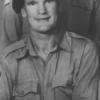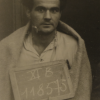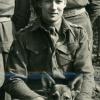I was then a captain Royal Signals, Adjutant of 6 Airborne Divisional Signals, and was admitted to the planning stage at Syrencote House in February. Many rehearsals and exercises were held and Salisbury Plain was generally kept busy.
One moonlit night I led a stick of parachutists in a practice jump and we landed near Stonehenge, but not surprisingly at three o'clock in the morning the troops were not interested in its history but rather had in the mind the march of several miles to our camp at Bulford.
We were paraded before the King and Queen on one occasion and naturally there was growing excitement about the forthcoming D-Day. The task of Div. Sigs. was of course to provide communications for all arms in the invasion force including navy, army and air force, but in addition two sticks were detailed to land at 11 o'clock local time the previous night with the two stick commanders fitted round their waists with 'sausages' of explosive to help in blowing up Rommel's Asparagus, fir poles to deter our gliders landing.
There was a delay of 24 hours due to bad weather, but mercifully General Eisenhower gave the signal to GO! One of the sticks was commanded by Lt. Col. 'Paddy' Smallman-Tew, the C.O. (later killed by a stray shell at Escoville) and the other by myself.
We took off from Tarrant Rushton and I was surprised to see that our pilot was Pip Dale whom I had known at school. The approach was uneventful except that, looking through the 'jump hole' I was amazed to see the vast number of ships of all sizes heading for France. Approaching the French coast there was plenty of flak and the sky seemed full of all sorts of fireworks, causing the pilot to take evasive action and this made it difficult to keep our feet with steel-studded boots on a metal floor, and also made accurate dropping difficult. I mistook the half-hour signal for the get-ready one which was not a help to morale as we had to stand for an unnecessary half hour.
On jumping I saw a stream of tracer rather near and curled up my legs seeking to avoid it! I landed about two miles from where I should have been and did not recognise the area so I shinned up a signpost, which the French had considerately left, and struck a match to locate the spot. The air by now was filled with the sound of thudding army boots as many troops arrived, and it was really Dante's Inferno, with mass bombing and large naval guns hard at it...
The first person I came across was Capt. Geoffrey Whiteley lying in a ditch with broken bones, and was only able to comfort him by assuring him that the stretcher bearers would be along soon.
Approaching the village of Ranville I saw the first dead German, who had rashly come out to see what it was all about and was at once shot down. There was little 'Asparagus' in the area and so I blew up a telegraph pole across the road to hinder any possible German reinforcements, which must have been a nuisance to our troops later on when they had to remove it.
Gliders which of course have no engines, soon whistled in, some crashing - one right on a farm building and few occupants survived. I thought I would try and join up with somebody and came across Lt. Col. Peter Luard who was competing with the gunfire by energetically blowing his hunting horn to rally his men. Altogether the noise was astonishing. He offered me a lift in one of his jeeps but when I discovered that it was going to Troarn to blow up bridges I declined as it was going in the wrong direction for me.
On the way to Ranville, where the chateau was to be our HQ, I came across Gen. Gale the Divisional Commander who had just landed in his glider. It was near a cross-roads and the General ordered a sergeant to remove the men who were gathered there, always a dangerous spot for enemy artillery. The man foolishly ignored him, saying they were not his men, so Gen. Gale, who was of course pretty keyed-up, exploded to his companion: "Shamus, Shamus, there's a man defying Richard Gale". Shamus Hickey, the A/Q, hastily ordered the men away, and a frightened sergeant very rapidly did as he was told. Going to the chateau Gen Gale knocked on the french windows and the startled occupants let in the unexpected visitors. Being of humbler occupation, I went to the outhouse where the Signal Office was to be set up.
Some worrying hours later my C.O. arrived; he had landed in a tree and was so excited he cut his rigging-lines and landed on his head. Thinking he heard Russian spoken he wondered whether perhaps by mistake he had been dropped in the wrong theatre of war, but it turned out to be a Polish unit which had been impressed by the Germans.
D-Day was itself was not very exciting for me except for continuous artillery fire from both sides, the Germans having been thoroughly aroused by now, but I managed to get to the vital Pegasus Bridge where Brig. Lord Lovat was crossing with his piper, a great relief for us as he was leading a sizeable body of commando reinforcements.
I managed to get a little sleep in a farm building on mounds of potatoes which were very knobbly for getting rest, but at least we were in France together with a multitude of other friendly people.
Next day, I went on a reconnaissance and was taken by a Frenchman to a house near the Ecarde quarries and saw a dreadful sight. The whole house had been systematically smashed up - furniture, clocks, windows, everything. It was said to have been the house of a notorious Nazi collaborator and this was the Maquis' revenge, a dreadful one.
There was talk of a German tank sculling around on what had been our Dropping Zone - a false alarm but we returned to Ranville nevertheless. Next day was comparatively quiet, and I went on another recce. and examined the tower of Ranville church, but towers were unhealthy as they were assumed to be lookouts, and a few shells drove me down. In the churchyard there were rows of our dead, laid out on stretchers, and I was shaken by the sight of a dead paratroop sergeant staring straight at me with wondering dead eyes.
One day when things had quietened down a bit my C.O. and I went to see the famed batteries of Merville, whose guns were feared as threatening the invasion fleet from deep casemates. They were the target of a coup-de-main party (commanded by Lt. Col. Terence Otway) early on D-Day morning which after much gallantry were captured and destroyed.
My C.O. was most anxious to see them, but the visit terrified me as he would keep on picking over boxes of shells, flares, etc. and knowing the habit of booby-trapping these I was on permanent tenterhooks. However, perhaps the German gunners did not have enough time for booby-traps as they were overcome with marvellous gallantry by our troops.
This visit had a sequel. The gun emplacements were liberally supplied with various coloured signalling flares and as I had always loved fireworks I liberated some of these and took them back to camp. But flares are dull things until let off, so one fine afternoon I ignited one glorious purple one. Unfortunately the light breeze carried the purple cloud across the field where our trenches were and went straight through the hedge across a table full of senior officers having lunch. I expected fearful retribution but they must have had a sense of humour and I heard no more about it.
Life in the quarries at Ecarde was fairly tame in our static role for some weeks, and what I recall by way of highlights was first the use we made of parachutes and pieces of glider, there being no further use for them. The parachutes were a godsend when it came to lining the trenches against damp mud. One day a snake got inside my lining and was quite difficult to remove.
I have a photograph of a large glider nose up-ended which made a cosy den for our cipher officer Norman Bradshaw.
When I began to dig my trench I came across some 'silver' spoons and forks, but on hearing about this the occupant of a nearby house turned up and explained that he had buried the family silver to keep it from the Germans - very sensible - so he got his property back.
Owing to the fact that our forces were held up by fierce German resistance (including the dreadful battle of Breville), it was three weeks before we moved forward. In the meantime we were well dug in and the most vivid memory I have of that time was the constant whispering through the trees of distant German machinegun bullets, particularly at night.
The move forward was fairly rapid, with German resistance of course and I shall never forget the sight of the town of Dozule burning fiercely as we approached. Eventually we were quartered in a cider orchard where trees gave a little cover. The German air force was not inactive, and I remember seeing the wreckage of one of their fighters with gruesome remains of the pilot. Both Paddy Tew and I removed some of the thick perspex windscreen and later carved crucifixes out of the easily-worked material.
One day in the orchard a noisy crowd came in, consisting of two or three women pursued and beaten by many others, the women having had their heads shorn as collaborators, desperately trying to escape the vengeance.
At long last, the army moved further towards the Seine, and as expensive airborne troops in September we were returned to England, embarking by scrambling over the Mulberry Harbour which had been damaged in the June gales.
So ended my stay in Normandy and I hope this account is accurate and unvarnished.
By Captain Anthony Windrum 6th Airborne Divisional Signals
Read More




Latest Comments
There are currently no comments for this content.
Add Comment
In order to add comments you must be registered with ParaData.
If you are currently a ParaData member please login.
If you are not currently a ParaData member but wish to get involved please register.